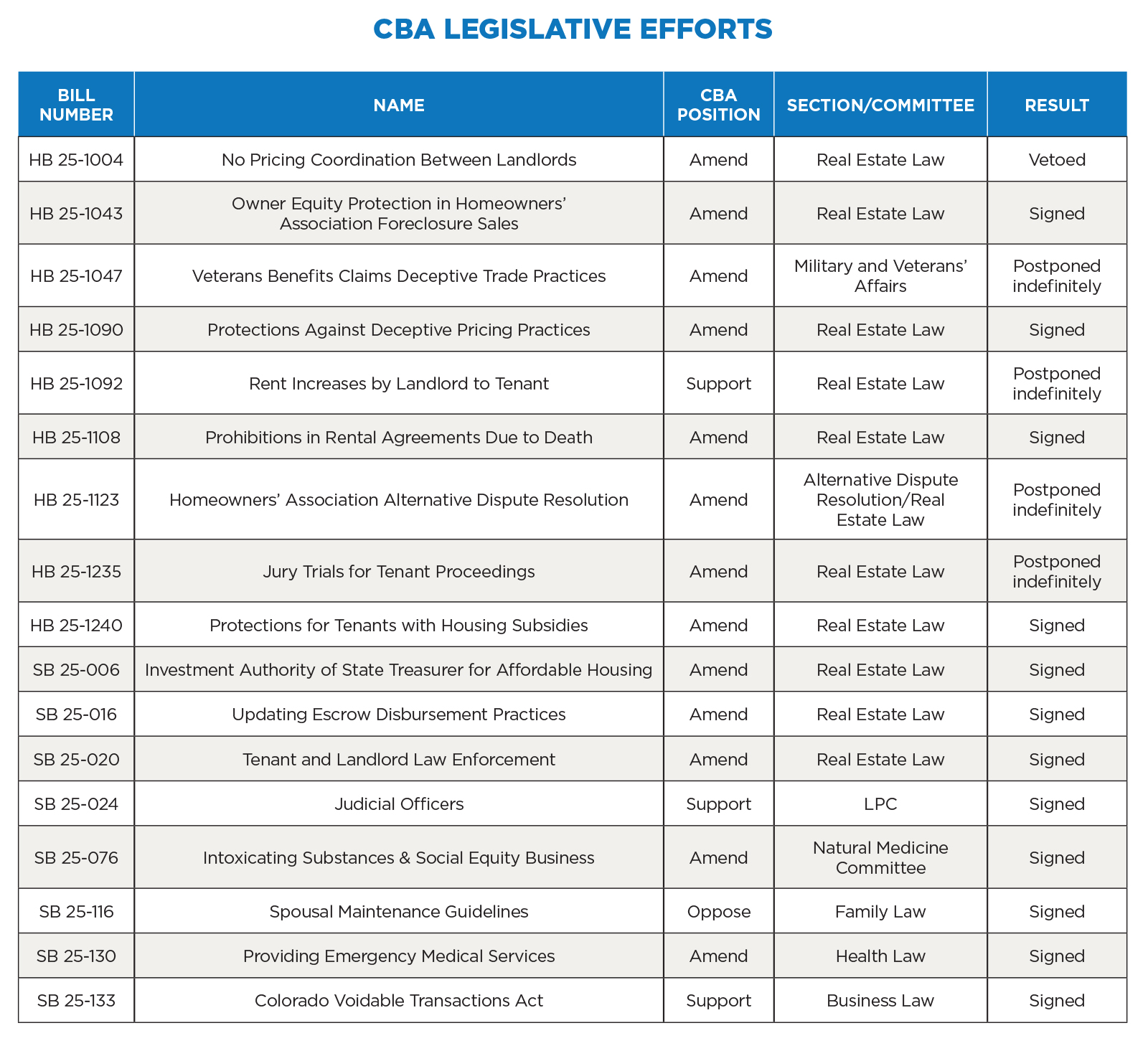
CBA’s 2025 Legislative Session in Review
September/October 2025
Download This Article (.pdf)
This article provides an overview of the CBA’s legislative efforts during the Colorado General Assembly’s 2025 session.
On Wednesday May 7, the General Assembly adjourned after 120 days, in accordance with the Colorado Constitution. Though familiar in its chaos, the 75th General Assembly presented unique political challenges that seemed to grow every day. We bore witness to visceral policy disagreements, scandalous moments, and an almost too regular sprint to finalize and pass legislative proposals as the end approached. Tension seemed to permeate every conversation. We saw Democrats challenging Governor Polis and also shoring up against possible Trump administration actions, and significant focus on closing a $1.2 billion budget shortfall. Alone, one of these is enough to consume a session, but all together they led to a complicated road for legal advocacy in 2025.
By the Numbers
Just like during other recent sessions, Democrats had a majority in both chambers and also held the Governor’s office. What is new, though, is that Democrats lost just enough seats in recent elections to lose their supermajority status. More succinctly, the votes in both the Senate and House were one vote shy of the veto-proof two-thirds normally held by a supermajority. This fact drastically alters the dynamic between the executive and legislative branches. Below is a snapshot of this year’s General Assembly session:
- bills introduced: 657
- bills passed: 476
- bipartisan bills: 86%
- bills vetoed: 11 (the most during Governor Polis’s tenure)
- House: 43D-22R
- Senate: 23D-12R
Additional shifts in the General Assembly’s composition were due in large part to a plethora of vacancies in both chambers. Twenty-three new members were sworn in on the first day, seven former House members were sworn into the Senate, three senators resigned their seats after election day, and vacancy committees across the state appointed three new members. Perhaps even more important to members of the CBA, the General Assembly now includes approximately 14 practicing attorneys and a handful more that are nonpracticing. While most of them are first-term legislators and not necessarily in influential positions, it’s the highest representation of our community we’ve seen in nearly a decade at the Capitol. As we move to shift our legal advocacy to consider strategy across multiple legislative sessions, this point will become increasingly important.
With the help of members in all CBA sections and committees, we reviewed nearly every bill and took official positions on 17 bills. We saw increased interaction from sections that always do tremendous work, such as Real Estate Law, Trust and Estate Law, Elder Law, and Family Law, and we also welcomed the analysis and input from the Military and Veterans’ Affairs and Health Law sections, as well as the Natural Medicine Committee.
CBA Agenda Bills
Historically, the Colorado legislature is one of the most productive in the country, with a high percentage of introduced bills enacted.1 For example, in 2024, Colorado enacted 74% of all bills introduced; the effectiveness rate for all state legislatures combined that year was 26%. And while drafting and running legislation is always a considerable lift, we must still dedicate time and resources to defending our various positions on a large variety of bills. Whether it’s reengaging on the topic of algorithmic rent setting or working with the Colorado Hospital Association in reworking the executability of providing emergency medical services, each position is an exponential example of additional work by our members and on behalf of our membership.
Given our high efficiency rate, it’s not hard to extrapolate how much time is invested into the unseen and unspoken parts of legal advocacy. This intangible part of lobbying often encapsulates late-night conversations, long-developed relationships, and a keen understanding of when to act. It also includes the numerous hours our members have volunteered to review, participate in meetings with legislators, and testify at the Capitol. Their dedication is at the core of our work and our success. As a lobbyist, I am always impressed by our organization’s ability to navigate these entangling alliances, which grow increasingly complex every session. Below are just a few of the CBA’s efforts during this legislative session.
SB 25-133: Colorado Voidable Transactions Act
The Business Law Section’s dedication led to success in passing SB 25-133. This is a bill that was drafted, introduced, and ushered through the legislative process entirely by the CBA. The bill focused on reworking and updating the Colorado Uniform Fraudulent Transfers Act (CUFTA). In addition to updating some of the definitions and terminology, the bill took the important step of establishing burdens of proof and evidentiary requirements for various claims related to voidable transactions. Business Law Section members have long believed that these changes were necessary to align CUFTA—unchanged since 1991—with modern practices.
Uniform voidable transactions legislation has been many years in the making, initiated by the Uniform Law Commission in 2014. We worked with our Uniform Law Commissioners for several years to fine-tune the details that best suited the state. Those efforts resulted in a uniform bill in 2022, SB 22-122 (Uniform Voidable Transactions Act). Ultimately, that bill failed due to still being on a different page from the Uniform Law Commission regarding the choice of law.
Although our first attempt was unsuccessful, we continued to confer with stakeholders about the need for this legislation, and we were able to bring it back separate from the Uniform Law Commission in 2025. We continued our proactive approach and maximized relationships with stakeholders during the interim, remained open to changes, and were able to introduce our own version of the bill in this recent session. That challenging work paid off, and we successfully ushered our bill through two committees and two chambers with efficiency and elegance. Special thanks to our sponsors (who are also CBA members), Senators Marc Snyder and John Carson, and Representatives Sean Camacho and Matt Soper.
HB 25-1004: No Pricing Coordination Between Landlords
The Real Estate Section took on several bills, and particularly spent significant time working on HB 25-1004. The bill revisited a bill from last year (HB 24-1057) regarding the use of algorithmic pricing tools to set rents. Much like last session, early versions exposed landlords to significant and unnecessary litigation from tenants. We engaged with sponsors early and added our voice to many who pursued several amendments, such as removing the private right of action. The bill passed and clearly signals the continued pressure by the General Assembly for increased regulatory scrutiny of landlord practices. Although we would have preferred more extensive changes, we continued to provide our evidence-based reasoning as the executive branch considered the bill. It was ultimately vetoed by Governor Polis.
SB 25-116: Spousal Maintenance Guidelines
Our Family Law Section members also deserve much credit for their work this session. They have long been fierce advocates for good law in their practice area and remain passionate about their work. That couldn’t be more evident than in their work on SB 25-116. The bill extends the disclosure period for protection orders in dissolution of marriage and legal separation cases from two to five years and requires the court to consider various forms of abuse when making decisions.
While we opposed the bill due to its potential to lead to inequities in no-fault divorces, it was clear that some version was going to pass. Thankfully, due to previous relationship building, we were able to work with victims’ organizations and the Colorado Women’s Bar Association to remove the most harmful parts of the bill. Working on legislation is never a zero-sum situation. While we always fiercely advocate for our position, we will always see the most success when we recognize we are not alone in the process. The Family Law Section has been extremely successful in adapting in these situations and helping avert potential harmful bills.
HB 25-1090: Protections Against Deceptive Pricing Practices
HB 25-1090 aimed to improve transparency by requiring businesses to disclose all mandatory fees and the total price of goods, services, and property. The Real Estate Section took the lead on analyzing this bill since it was primarily focused on landlords, but there is also potential for broader application to service-based businesses and other sectors, such as attorneys. While some language included may create a safe harbor for the legal sector, there is still a significant concern about the possible impact on attorneys.
The CBA Legislative Policy Committee (LPC) expressed concern that the bill’s language could unintentionally impact our legal community by creating unclear compliance standards and exposing legal professionals to unnecessary litigation. The LPC submitted a formal veto request to the Governor’s office due to these concerns but was informed that the Governor would still sign the bill. While the effects of the bill remain uncertain, there are future opportunities to remain engaged with the Attorney General’s office as it enters into the rulemaking process on this bill before its enactment in 2026. Additionally, we may need sections to take an active role with CLE programming to ensure that our membership is aware and educated. CBA Executive Director Nicoal Sperrazza put it best: “This action is part of our ongoing efforts to protect the integrity of legal practice and ensure that legislation supports—not hinders—professional responsibility and client service.”2
CBA Goes to Washington
During this year’s legislative session, we also made time to take our advocacy to Washington, DC. The CBA legislative team, joined by Executive Director Nicoal Sperrazza, met with members of the Colorado Congressional Delegation to shore up their support for Legal Services Corporation’s (LSC) budget request. Federal support for LSC is a key source of Colorado Legal Services (CLS) funding—for example, LSC provided roughly $6.6 million in funding to CLS in 2024.3 The CBA looks forward to expanding its influence at the federal level in the coming years.
Closing Thoughts on the 2025 Legislative Session
After 128 years, the CBA remains the leading voice of advocacy for Colorado’s legal community. State and federal elected officials will come and go, but we will continue to fight tirelessly for the justice system and good law. Undoubtedly, we will face challenges, but our greatest strength remains our ability to adapt to the ebb and flow of change in government. We will face every 120-day legislative session with the same passion while remaining cognizant of how we can better serve our members. We will always seek out new relationships and champions. We will always fight to be in the room when we need to be.
Of course, that fight is impossible without our members. Reach out, get involved, and be part of our work next year. I look forward to it. A very special thanks to Sol Malick of Peak Government Affairs and all the members of the Legislative Policy Committee for all of their work this year.

Related Topics
Notes
citation Mounsey, “CBA’s 2025 Legislative Session in Review,” 54 Colo. Law. 38 (Sept./Oct. 2025), https://cl.cobar.org/features/cbas-2025-legislative-session-in-review.
1. https://fiscalnote.com/2024-state-sessions-recap.
2. Sperrazza, CBA Executive Brief: May 2025 (May 28, 2025).
3. Legal Services Corporation, Budget Request: FY 2025, https://lsc-live.app.box.com/s/oi1atcgn8xmvofc70aildz3bhg5p0zn5.


